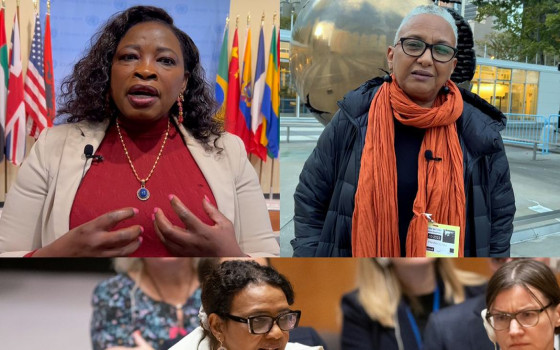
To protect Sudanese women from sexual violence...female human rights defenders call on the international community to take action

- Europe and Arabs
- Saturday , 4 November 2023 12:49 PM GMT
New York: Europe and the Arabs
Sudanese women human rights defenders called on the international community to act urgently to protect women in Sudan from the danger of rampant sexual violence amid the ongoing war in various parts of the country.
This invitation came from three Sudanese women human rights defenders, who spoke with UN News, while they were in New York, to participate in activities marking the anniversary of Security Council Resolution No. 1325 on women, peace and security. According to a post on the official United Nations website on Saturday morning
These annual events are held to emphasize the important role played by women and the need for their meaningful involvement in peace processes.
The three activists highlighted the suffering of Sudanese women due to the war, which exacerbated the suffering of Sudanese men and women, and forced millions of them to flee their homes. Parties to the conflict also face accusations of using women's bodies as "war arenas", that is, using sexual violence - most notably rape - as a method of war.
Representing civil society in Sudan, the Regional Director of the Strategic Initiative for Women in the Horn of Africa, Hala Al-Karib, spoke at a Security Council session held under the title “Women’s Participation in International Peace and Security: From Theory to Practice.”
Al-Karib said that her participation in the session was aimed at providing insight into the systematic and massive violence and atrocities that happen to Sudanese women, especially in Darfur - and to clarify that what is happening in Sudan is a blatant violation in which women’s bodies and lives are used as a tactic for this war, as she put it.
She said that the crimes committed during this war “may amount to genocide,” noting that the lives of women and what happens to them are not taken “seriously enough, and we are treated as collateral damage.”
Hala Al-Karib called on the international community to carry out “its duty, which it abandoned more than twenty years ago, during which the violations, abuse and killing of Sudanese people did not stop,” she said.
She added, "Rape, sexual assault, dispossession of property, and forced displacement. These are all crimes committed by the regime of former President Omar al-Bashir, in cooperation with the Janjaweed militias, which later became the Rapid Support militias."
The Sudanese activist said that these violations continued even during the transitional period, and the perpetrators of the crimes were not tried, “but were promoted to higher positions in the state, which gave the violators a feeling that they were above the law,” she said.
Hala Al-Karib stressed the need to hold accountable the crimes committed, noting that the current violence is an extension of "the violations that occurred against civilians in Darfur twenty years ago by the Rapid Support Forces."
But now, according to Ms. Hala Al-Karib, the two sides - the Sudanese army and the Rapid Support - are committing “violations against civilians, represented by the systematic bombing of residential areas in Khartoum and Nyala, which leads to civilian casualties.”
Al-Karib stressed the need to stop hostilities completely, and added:
“We called on the Security Council to add sexual violence and violence against women as one of the conditions for lifting sanctions on Sudan, because the Sudanese government has believed, for a long time, that it can practice whatever sexual violence it wants. This issue has become intolerable because it has continued for more than twenty years.” ".
Nimat Ahmady, President of Darfur Women for Hard Work, says that the ongoing war has exacerbated the disaster that has been going on in Darfur for twenty years, calling on the world not to forget Sudan in the midst of the many disasters taking place in various parts of the world.
Ahmadai referred to her meeting with representatives of member states of the Security Council and United Nations officials - including the United Nations Special Representative on Sexual Violence in Conflict - with the aim of amplifying the voice of Sudanese women by focusing on demands to provide protection and security, delivering humanitarian aid to all those affected by the war, especially women, and supporting women’s organizations. And civil society organizations on the ground that play a major role in helping those affected by war, especially women affected by sexual violence.
Fahima Hashem, a feminist activist and women's rights defender, said that women are always victims of the recurring conflicts that Sudan has been witnessing, warning that violence against women aims to "break women and abort feminist work."
She stated that the political feminist movement in Sudan has been fighting for women's rights in Sudan, noting that successive governments have continued to ignore women's rights.
She also talked about the campaigns that emerged after the revolution that toppled the regime of former President Omar al-Bashir in 2018, which demanded the inclusion of women at least 50 percent in the government.
Ms. Fahima also touched on what she described as “unfair laws against women” that were put in place by the government of former President Omar al-Bashir - such as the Personal Status and Public Order Laws - and these laws still exist despite their repeal in the wake of the revolution. She added:
“Even before the war, women’s bodies were systematically used as battlefields. When the current war broke out, people, especially in Khartoum, saw different situations, where their homes were occupied, their girls and boys were raped in front of their eyes, and some of them were kidnapped to other areas. A uglier thing could not happen. Who is this for women?
All of these crimes, according to Ms. Fahima, are crimes against humanity and their perpetrators are supposed to be held accountable, especially after the issuance of Resolution 1325.












No Comments Found